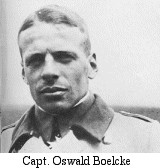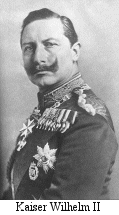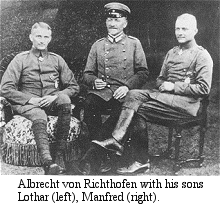
|

 Ursula's History Web
Ursula's History WebManfred von Richthofen Page 2 |

|
|
Zeppelins over England The German Imperial Air Service began their attack on England, with huge silver Zeppelins bombing Norfolk.. Kaiser Wilhelm, the oldest grandson of Queen Victoria, issued orders for Zeppelin bombings only after long soul-searching. He worried about the irreplaceable historic sites and landmarks in London, and also about the safety of his relatives at Buckingham Palace. His admirals, who rightly considered the royal Navy to be Germanyís deadliest enemy, applied increasing pressure on the Kaiser to grant permission to bomb shipping and port facilities as part of counter measures against England. The Kaiser approved limited Zeppelin bombing, but forbade the dropping of explosives on Londonís residential areas and, "above all, on Royal Palaces". Londonís eastern suburbs were bombed for the first time on May 31st, 1915 by an Army Zeppelin, which made the Navy furious. The admirals heatedly explained to the Kaiser that everything in London, including the stock exchange, was vital to Englandís war effort and should be hit. The Kaiser reluctantly agreed, with the condition that raids were to be launched only on weekends, when many Londoners were out of town. The admirals countered that such restrictions would put their airships on the mercy of the weather. Sorrowful, Kaiser Wilhelm agreed, and unlimited attacks begam on England that autumn. British biplanes eventually succeeded of bringing down the airships by firing incendiary and exploding bullets into the attackerís helium containers, and then speeding away. This shortcoming of the Zeppelins was recognized by a handful of German officers, even before the raids began. One of those officers was Major Wilhelm Siegert, who believed that the function of airplanes was to drop bombs. He wanted them large enough to carry many bombs. After months of lobbying he was given permission to form a squadron of heavy bombers for use against England, which would be called the England Squadron. But it was such a secret undertaking, that it was still code-named "Mail Pigeon DetachmentóOstend" at the time Manfred von Richthofen arrived at the airdrome. Siegert was told he would not have the larger Gothas until February 1917, so he had to use a variety of observation planes adapted to bombing, as well as large Battle Planes, the forerunners of Gothas and Giants. Manfred disliked them at first sight. He called them "apple barges" because of their clumsiness, and he hated the location of the observerís seat, which was directly between the two propellers. From there he had no view of the explosions caused by the bombs he released. One day Manfred and Lt. Zeumer had taken up an "apple barge" to see how it would handle in combat, although neither had ever seen another airplane in the air. Suddenly they saw a Farman biplane of the Royal Flying Corps on an observation mission over German lines. Manfred could not get off a clear shot for fear of hitting his planeís tail or Zeumerís head. Both planes circled for about five minutes and then the Farman disappeared over the British lines. Both German officers blamed each other after they had landed, with Richthofen blaming Zeumer for not flying well enough to get him in position to fire, and Zeumer countering that they could have gotten the British plane if Richthofen had been able to shoot straight. When Manfredís anger subsided, he began thinking how difficult it was to shoot from two-seaters and how easy it was for the enemy to shoot at them. The new single-seat scouts were the answer for making kills, but one had to be a pilot for that, he thought. In the meantime, Anthony Fokker tested and demonstrated his monoplane, which he then manufactured in his factory in Berlin. The aviators were delighted with this new type of aircraft. The Pilot On October 10, 1915, Richthofen was judged ready for his first solo flight. He did exactly as instructed, but on landing, the biplane hit the ground hard, bounced and nosed over. Two days later he made a series of successful landings, but not perfect and he was told that he had failed the test. Finally his examiner was satisfied with his performance, and Manfred was sent to Doeberitz, just west of Berlin, where he enrolled in the pilot training program. It was tough, but Manfred was determined. Finally he was notified on Christmas Day 1915 that he would be awarded his pilotís certificate. In March of the next year he was posted to the 2nd Fighting Squadron near Verdun on the western front.  Manfred continued to hone his skills in the following weeks, flying in all kinds of weather. One day around this time, Oswald Boelcke arrived to visit his brother, who was Richthofenís commander. In truth, Boelcke, who was Germanyís greatest combat pilot to date, was scouting out pilots for his new group called Jagdstaffel 2. (Jagen in German means to hunt, and Jagd means the hunt). He recruited Manfred and another pilot, and they left for Lagnicourt, France on September 1st. There, they were told to stop the British observation planes, protected by scouts, who were reeking havoc with the German army. It was here, under the expert guidance of Boelcke, that Manfred von Richthofen became a hunter. Manfred continued to hone his skills in the following weeks, flying in all kinds of weather. One day around this time, Oswald Boelcke arrived to visit his brother, who was Richthofenís commander. In truth, Boelcke, who was Germanyís greatest combat pilot to date, was scouting out pilots for his new group called Jagdstaffel 2. (Jagen in German means to hunt, and Jagd means the hunt). He recruited Manfred and another pilot, and they left for Lagnicourt, France on September 1st. There, they were told to stop the British observation planes, protected by scouts, who were reeking havoc with the German army. It was here, under the expert guidance of Boelcke, that Manfred von Richthofen became a hunter.Toward the end of 1916, German airplane manufacturers started to paint their planes in camouflage color, but Manfred insisted on painting his plane scarlet red. On January 16, 1917 he was awarded the medal Pour le Merite for downing sixteen enemy planes in aerial combat. At the same time he was given command of his own scout squadron, Jasta 11. German newspapers made the most of the countryís newest hero. His new post was at Douai, France and after he arrived there, he began looking for competent pilots to join his squadron. By February the papers reported that "the red battle flyer" (der rote Kampfflieger) had his twenty-first kill. British pilots called Manfred the "Bloody Red Baron", but he was never called "the Red Baron" in Germany. On April 29th he scored his 50th kill in the air. Kaiser Wilhelm II sent him a telegram to congratulate him, although the Kaiser must have had other things on his mind: The United States of America had entered the war three weeks earlier. The Kaiserís Invitation  On the evening of the next day, April 30th, Manfred was told that he was expected in Cologne for a briefing at General Staff headquarters. He also received an invitation for lunch with the Kaiser and the Empress. He left his brother Lothar, who had joined his squadron earlier, in charge during his absence. After arriving in Cologne, Manfred had a short rest, and then met with General von Hoeppner. He was told that he was to command one of the new Jagdgeschwaders (Hunting Squadrons). He also learned that they had another project for him: he was to write his memoirs. During his six weeks leave at home he would be given a stenographer, then the manuscript would be sent to the General Staff HQ for editing. The plan was to publish his story in magazine installments, then it would come out in paperback. Manfred liked the idea when he was told that the earnings would go to his family. They would need it if something should happen to him. On the evening of the next day, April 30th, Manfred was told that he was expected in Cologne for a briefing at General Staff headquarters. He also received an invitation for lunch with the Kaiser and the Empress. He left his brother Lothar, who had joined his squadron earlier, in charge during his absence. After arriving in Cologne, Manfred had a short rest, and then met with General von Hoeppner. He was told that he was to command one of the new Jagdgeschwaders (Hunting Squadrons). He also learned that they had another project for him: he was to write his memoirs. During his six weeks leave at home he would be given a stenographer, then the manuscript would be sent to the General Staff HQ for editing. The plan was to publish his story in magazine installments, then it would come out in paperback. Manfred liked the idea when he was told that the earnings would go to his family. They would need it if something should happen to him.After meeting with Hindenburg and Ludendorff the following day, he was presented to the Kaiser. Manfred again received congratulations on his 50th kill, and the Kaiser also wished the newly promoted Captain a happy birthday, which was on this day. He was 25 years old. As a birthday present the Kaiser presented him with a bronze and marble bust of himself. After lunch, the Kaiser talked to Manfred about the new antiaircraft guns and that evening, Field Marshall von Hindenburg gave a dinner for him. The next day, he flew to Bad Homburg, where the Empress received him at a Royal estate. There he posed for pictures with the Empress and was invited for lunch with the ladies of the court. His hostess presented him with another birthday present: a gold cigarette case in white enamel and inscribed with her name. Manfred genuinely liked the Empress, she was as he later said "the grandmother type". When the formalities were over, he was almost sorry to leave. Home on Leave  First, Manfred stopped a few days to go hunting in the Black Forest. There he received the notice that his brother Lothar had been shot down. He was wounded, but alive. From the Black Forest Manfred went to Adlershof, near Berlin, where they were testing new airplanes. From there, he went home to Schweidnitz, in Silesia (now Poland). Soon the stenographer, a pretty young lady, arrived to help him with his book. The presence of a young unmarried attractive lady at the Richthofen estate started rumors that the local hero was romantically involved. It was not true, but Manfred in all seriousness told some local busybodies that the girl indeed was his "bride". They worked on the manuscript as planned and Manfred also did some hunting around the estate. The news from the front was grim, and on June 14th he returned to his squadron. During the summer and fall Manfred scored several more victories. He spent Christmas at the front, with his father, Major Albrecht von Richthofen, and his brother who had recovered. First, Manfred stopped a few days to go hunting in the Black Forest. There he received the notice that his brother Lothar had been shot down. He was wounded, but alive. From the Black Forest Manfred went to Adlershof, near Berlin, where they were testing new airplanes. From there, he went home to Schweidnitz, in Silesia (now Poland). Soon the stenographer, a pretty young lady, arrived to help him with his book. The presence of a young unmarried attractive lady at the Richthofen estate started rumors that the local hero was romantically involved. It was not true, but Manfred in all seriousness told some local busybodies that the girl indeed was his "bride". They worked on the manuscript as planned and Manfred also did some hunting around the estate. The news from the front was grim, and on June 14th he returned to his squadron. During the summer and fall Manfred scored several more victories. He spent Christmas at the front, with his father, Major Albrecht von Richthofen, and his brother who had recovered.Attending the Peace Conference at Brest-Litovsk The Russian Revolution had forced the abdication of Tsar Nicholas II. A provisional government was borne out of the revolution, with Lenin orchestrating events from abroad. Lenin and his party had demanded peace, land and bread, without delay. After returning to Russia in the spring of 1918, he and his Bolshevik leaders took Russia out of this "Imperialistic War". The Allies refused to recognize the Soviet government, resulting in Russia entering alone into peace negotiations with the Central Powers (Germany, and her allies, Austria-Hungary and Turkey) at the town of Brest-Litovsk. Prince Leopold of Bavaria, Commander of the German forces in the East, had invited the Richthofen brothers to attend the peace conference at Brest-Litovsk, perhaps in an attempt to impress the Russians. After a long train trip Manfred and Lothar arrived just as the Russians were departing for Petrograd for consultation with Lenin. While waiting for the Russian delegation to return, the brothers accepted an invitation to do some hunting in the beautiful forest, which surrounded the hunting lodge, once the property of the Romanovs. On January 5th, 1918, they went back to Brest-Litovsk. The Russians had returned and the brothers attended several sessions of the peace conference. When it became obvious that the Russians were not impressed by the presence of the celebrities of the German Imperial Air Service, the brothers returned to Germany. |

|
 for more.
for more.